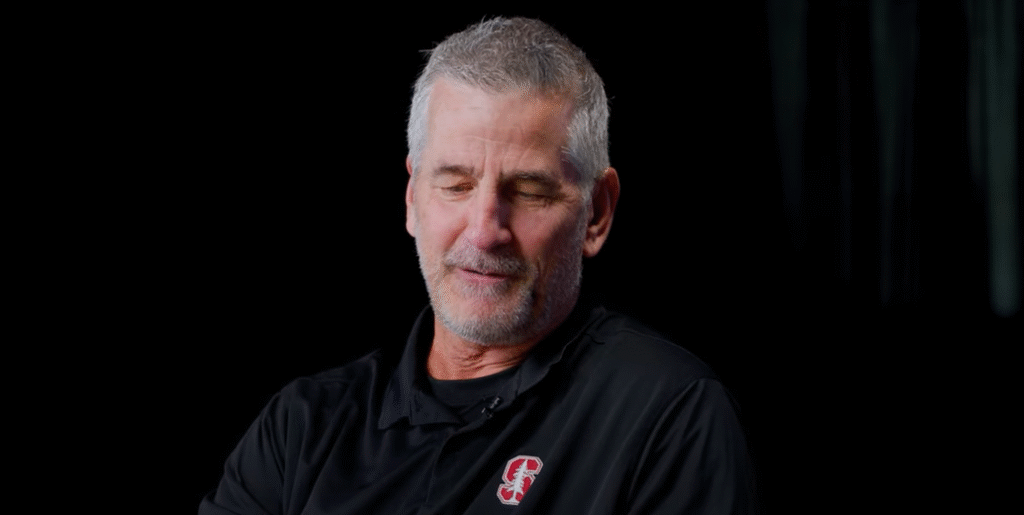A succession of contracts, setbacks, and reinventions in Frank Reich’s coaching career serve as a master class in resilience, demonstrating how adaptability can triumph over failure. His career has moved from the NFL to the college ranks in the last ten years, illustrating the emotional instability and financial scale of contemporary coaching. He recently signed a one-year interim contract at Stanford, which is more than just a pay raise; it’s a calculated move to regain rhythm and credibility.
In 2018, after his Super Bowl-winning season as offensive coordinator with the Philadelphia Eagles, Reich signed a five-year contract to become head coach of the Indianapolis Colts. His calm, logical approach won him respect even though his leadership was put to the test right away. He established himself as a reliable person with two postseason trips and a 2026 contract extension. However, the Colts entered a cycle of instability that no contract could end when Andrew Luck’s unexpected retirement changed the course of the team. Even though Reich’s term ended in November 2022, his guaranteed contract guaranteed him a sizable payout of an estimated $36 million over the remaining term.
The financial cushioning was a reflection of a larger reality: even fired coaches rarely lose in the high-stakes football economy of today. Reich’s case turned out to be an especially notable illustration. Even after being fired, he kept making millions from Indianapolis while deciding what to do next, representing the business side of a field where short-term failure frequently leads to long-term financial stability.
Table: Frank Reich – Biography and Professional Information
| Category | Details |
|---|---|
| Full Name | Frank Michael Reich Jr. |
| Date of Birth | December 4, 1961 |
| Age | 63 (as of 2025) |
| Birthplace | Freeport, New York, USA |
| Education | University of Maryland |
| Profession | Football Coach, Former Quarterback |
| Playing Career | Buffalo Bills (1985–1994), Carolina Panthers (1995), New York Jets (1996), Detroit Lions (1997–1998) |
| Coaching Career | Colts (2018–2022), Panthers (2023), Stanford (2025–present, interim) |
| Notable Contract | $36 million extension with Colts (through 2026), $4 million one-year deal with Stanford |
| Achievements | Led Colts to multiple playoff appearances; orchestrated historic comebacks as NFL QB |
| Reference | Frank Reich – Spotrac |

When January 2023 rolled around, Carolina called. The Panthers, in need of stability, reportedly offered Reich a four-year contract worth over $9 million a year. It was a kind of homecoming for him—the team he had played for briefly when he was a quarterback. It was thought that his arrival would help develop rookie quarterback Bryce Young and breathe new life into a struggling team. Due to “organizational misalignment,” owner David Tepper dismissed him after just 11 games and a 1–10 record. The Panthers’ guarantee clause allowed Reich to earn almost $25,000 per day while he was unemployed, so his contract once again became both his protection and his paradox.
By the end of 2023, Reich was among the highest-paid unemployed football coaches thanks to the combined salaries from Carolina and Indianapolis. This oddity highlighted how coaching economics have changed over time. Teams spend a lot of money on leadership, but they are incredibly impatient when results don’t show up. Reich’s situation was comparable to buyouts that were observed with Matt Rhule, who received millions after leaving the Panthers, and Jon Gruden, whose Raiders payout was said to have exceeded $40 million.
Reich’s tale took an especially inventive turn in March 2025. Coach Troy Taylor was hired on a one-year, $4 million interim contract by Stanford University, which was in turmoil after firing him. Reich’s former quarterback, Andrew Luck, the new general manager, announced the move, which seemed like poetic symmetry. Their reunion was calculated rather than purely sentimental. Reich’s leadership, according to Luck, was “exceptionally clear” and “incredibly stabilizing,” with the potential to change the program’s course even in a single season.
Reich saw the Stanford agreement as more than just a contract; it was a change in direction. By removing himself from the NFL limelight, he embraced a mentoring-focused atmosphere that played to his strengths, which were mentoring, inspiring, and nurturing young talent. His cool, collected manner, which was once criticized for being too measured for the professional arena, suddenly proved to be ideal for collegiate athletes navigating change and uncertainty.
The Stanford agreement was characterized as beneficial to both parties by observers. It gave the university immediate legitimacy and leadership continuity, and it helped Reich regain equilibrium following two high-pressure departures. After being characterized by sudden terminations, his career started to resemble a path of deliberate reinvention. His future prospects, including a full-time college position or a possible return to the NFL, were also improved by the move.
Beyond its strategic and financial ramifications, Reich’s career development reveals more about contemporary coaching culture. Contracts now function as volatility insurance policies and are more about leverage than loyalty. Reich’s journey, which included a one-year college experiment and guaranteed millions in the NFL, aptly illustrates this dynamic. It’s a system that reinforces resilience and reputation just as much as outcomes, showing how perception frequently creates opportunity.
But Reich stands out for his unflinching professionalism. He never openly criticized ownership, even when choices seemed unfair or hurried. He was calm in tone, and his appreciation was particularly sincere. Because of his humility and stellar playing and coaching records, he is still well-liked in the sports community. His connections show a leadership philosophy based on empathy and teamwork, which are becoming more and more uncommon in high-stakes coaching, especially with individuals like Andrew Luck.
The larger sports community believes that Reich’s financial history reflects changing market conditions. His large, guaranteed, and strategically offset contracts demonstrate how teams now manage risk. Coaches such as Reich represent a time when flexibility has become a commodity. Beyond the locker room, they have a significant impact on stories about leadership in a cutthroat field, loyalty, and economics.
